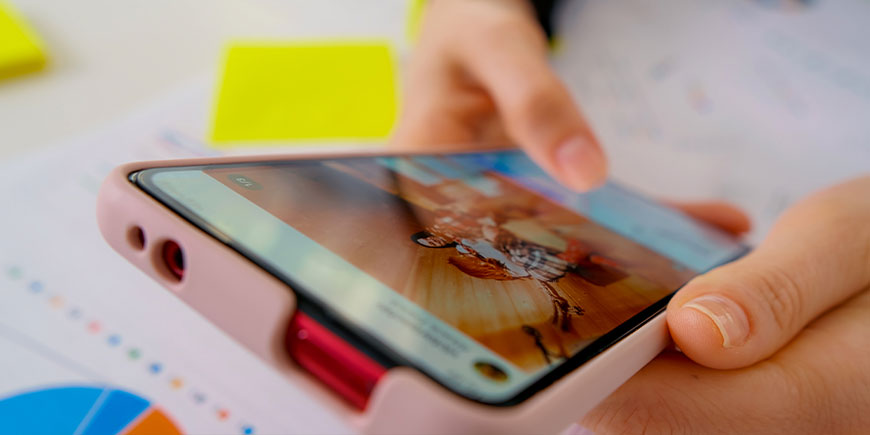The Carolina Foundation is highlighting a phenomenon that is now very common: a mother breastfeeding her child while she scrolls on her smartphone.
Scrolling is a gesture you make every day, all the time, without even thinking about it. A cartoon by the Carolina Foundation shows how widespread it is, even among new mothers who breastfeed their babies, and highlights the risks, including to fertility.
Scrolling
We use the term “scrolling” to refer to the act of moving from video to video in a social network’s algorithmic maelstrom, in order to pass the time with little entertainment pills.
If we do this so often, we expose ourselves to a real social addiction, which takes us away from the possibility of experiencing quality time. For example, with our children, from their earliest years.
In fact, you only need one hand and your thumb to hold the smartphone and scroll through the content. And in the meantime, you can have a drink, stir the sauce or… breastfeed.
But does it all hurt? And what does the newborn feel?
Hours (lost) on mobile phone
Social networks such as Instagram, for example, have shown that they care about the health of young people online by promoting a ‘Guide to Child Safety Online‘. But just a few days ago, a proposal was made to add a new feature to the platform that would limit its use in the evening/night to make it easier to sleep. It consists of an automatic message from the social network during the night hours. It is not possible to deactivate it, unlike the “Take a break” and “Do not disturb” tools that are already available on the platform.
And when you’re a new mum, sleeping can become even more important. In the first few months of a baby’s life, you may wake up up to four times in a single night to breastfeed or for hygiene needs such as nappy changing. It is therefore dangerous to take these minutes during the baby’s meal if you choose to use scrolling as a pastime.

What happens to mothers’ and babies’ brains during breastfeeding
«The bond between parents and newborn babies runs through the body, from the catch of a glance to the sound of a voice as they are held. These small gestures and details can activate the production of hormones such as oxytocin in both mothers and fathers. », explains Stefania Manetti, President of the Paediatricians’ Cultural Association.
Oxytocin is the hormone that regulates care and a sense of protection. «So by producing oxytocin, mothers and fathers feel more available to play, care and protect», continues the ACP President.
All of this has a positive effect on the neurological development of babies and on the synapses, i.e. the connections that regulate cognitive, sensory and motor functions. «If this flow is interrupted due to chronic or toxic stress, the brain slows down its growth, which affects the child’s brain architecture», adds Stefania Manetti.
Risks of scrolling while breastfeeding
The risk is related to the absence of oxytocin. Scrolling through online videos may pass the time, but not your child, who will feel – albeit a little – disregarded.
The Italian Society of Paediatrics reported on an Israeli study of a group of 20 mothers who were monitored for electrothermal activity (sweating/stress), cardiac output, various gaze patterns during breastfeeding and face-to-face interactions with their 3-6 month old babies. The study found that mobile phone use between feeds reduced mothers’ attention to their children. These interactions are necessary for the education and growth of young children. At this stage, the child is not yet able to express himself with a formed vocabulary, so the problem arises that signals and gestures that can only be perceived at a glance are not recognised in time.
The ‘weight’ of breastfeeding
In the intimate relationship between a parent and a child, there are a lot of balances at play. Breastfeeding, in particular, is a unique relationship moment, but also a very demanding practice. Not only physically, but also psychologically.
You will be unable to do other activities as you spend hours with your baby at your breast. So the other hand, the one that is not holding the baby, becomes the right compromise between you and the baby: the mobile phone is the bridge between the two.
However, the company of a smartphone and the pleasure of scrolling through the pages give a sense of well-being that is only apparent. And if the baby is deprived of the necessary attention of cuddles, kisses and hugs, something unexpected happens to the mother’s body.
Infertility risks
Fertility is also affected. Although there is no scientific evidence to confirm a direct cause and effect relationship, there is evidence that direct exposure to digital devices can be harmful to health in general.
Excessive use or holding the device too close to the body during pregnancy is not recommended as it may be harmful to the developing foetus.
For men, the University of Geneva has confirmed that proximity to the genitals – such as keeping a mobile phone in your trouser pocket – can reduce sperm efficiency.


